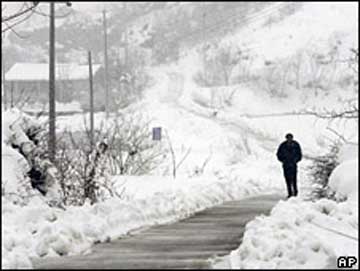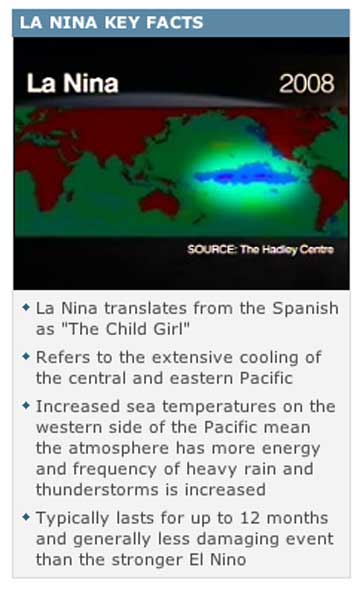
BBC News environment analyst
 |
| La Nina caused some of the coldest temperatures in memory in China |
Global temperatures will drop slightly this year as a result of the cooling effect of the La Nina current in the Pacific, UN meteorologists have said.
The World Meteorological Organization's secretary-general, Michel Jarraud, told the BBC it was likely that La Nina would continue into the summer.
This would mean global temperatures have not risen since 1998, prompting some to question climate change theory.
But experts say we are still clearly in a long-term warming trend - and they forecast a new record high temperature within five years.
The WMO points out that the decade from 1998 to 2007 was the warmest on record. Since the beginning of the 20th Century, the global average surface temperature has risen by 0.74C.
While Nasa, the US space agency, cites 2005 as the warmest year, the UK's Hadley Centre lists it as second to 1998.
Researchers say the uncertainty in the observed value for any particular year is larger than these small temperature differences. What matters, they say, is the long-term upward trend.
Rises 'stalled'
 La Nina and El Nino are two great natural Pacific currents whose effects are so huge they resonate round the world.
La Nina and El Nino are two great natural Pacific currents whose effects are so huge they resonate round the world.
El Nino warms the planet when it happens; La Nina cools it. This year, the Pacific is in the grip of a powerful La Nina.
It has contributed to torrential rains in Australia and to some of the coldest temperatures in memory in snow-bound parts of China.
Mr Jarraud told the BBC that the effect was likely to continue into the summer, depressing temperatures globally by a fraction of a degree.
This would mean that temperatures have not risen globally since 1998 when El Nino warmed the world.
Watching trends
A minority of scientists question whether this means global warming has peaked and argue the Earth has proved more resilient to greenhouse gases than predicted.
But Mr Jarraud insisted this was not the case and noted that 2008 temperatures would still be well above average for the century.
"When you look at climate change you should not look at any particular year," he said. "You should look at trends over a pretty long period and the trend of temperature globally is still very much indicative of warming.
"La Nina is part of what we call 'variability'. There has always been and there will always be cooler and warmer years, but what is important for climate change is that the trend is up; the climate on average is warming even if there is a temporary cooling because of La Nina."
Adam Scaife, lead scientist for Modelling Climate Variability at the Hadley Centre in Exeter, UK, said their best estimate for 2008 was about 0.4C above the 1961-1990 average, and higher than this if you compared it with further back in the 20th Century.
Mr Scaife told the BBC: "What's happened now is that La Nina has come along and depressed temperatures slightly but these changes are very small compared to the long-term climate change signal, and in a few years time we are confident that the current record temperature of 1998 will be beaten when the La Nina has ended."